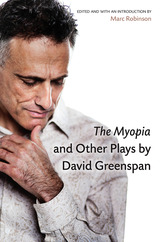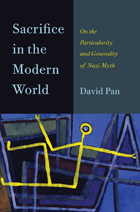
Playwright and actor David Greenspan has been a leading figure in Manhattan's downtown performance scene for over twenty years. His numerous accolades include a Guggenheim fellowship and four Obie Awards for his acting and writing, and most recently a fifth Obie for Sustained Achievement. Tony Kushner once declared Greenspan "probably all-around the most talented theater artist of my generation," and the New York Times has called his performances "irresistible." The Myopia and Other Playsbrings together five of Greenspan's most important works, accompanied by a critical introduction and new interview with the playwright.
Greenspan's work---often semiautobiographical, always psychologically intense---deals with issues of memory, family, doubt, and sexuality. The plays in this collection take particular interest in the motivations for erotic and aesthetic expression, forces inextricably linked in Greenspan's world. Critic and scholar Marc Robinson's informative introduction and lively interview with Greenspan further increase the collection's appeal to lovers of inventive playwriting, as well as students and scholars in the fields of Performance Studies, English, American Studies, and LGBT Studies.

A landmark book, David Pan’s Sacrifice in the Modern World seeks to explain the continuing emphasis, in modern times, on sacrifice. Pan specifically turns to the culture of sacrifice—ritualized and sanctified death—in Nazi Germany, showing how that regime co-opted an existing discussion of sacrifice and infused it with its own mythology. Pan suggests that sacrifice is a key value in every society but that there is a preponderance of association of sacrifice with Nazi culture and therefore a largely pejorative treatment of sacrifice.
Surveying the arguments of philosopher Alfred Baeumler and other symptomatic Nazi texts, Pan shows how the Nazis’ reactionary intellectual culture unraveled much of the Enlightenment project. In so doing, he is able to offer a compelling new perspective on basic theoretical concepts in the work of Kant, Nietzsche, Adorno, Bataille, Girard, and others. He posits that it is only by clearing our way through the Nazis’ misuse of sacrifice that we can understand the durability of sacrificial structures that—following several of the theorists he discusses— establish the fundamental values by which we live our lives.
Rather than condemning the Nazi appeal to sacrifice itself, this book looks at the particular ways in which sacrifice was distributed and structured within that society. All cultures must grapple with the existential violence of the human condition, and they frequently do so through aesthetic treatments of sacrifice, rooted in myths and traditions. Pan argues that our task is not to eradicate these traditions but to engage them by carefully evaluating the commitments and values that they imply.
READERS
Browse our collection.
PUBLISHERS
See BiblioVault's publisher services.
STUDENT SERVICES
Files for college accessibility offices.
UChicago Accessibility Resources
home | accessibility | search | about | contact us
BiblioVault ® 2001 - 2024
The University of Chicago Press









